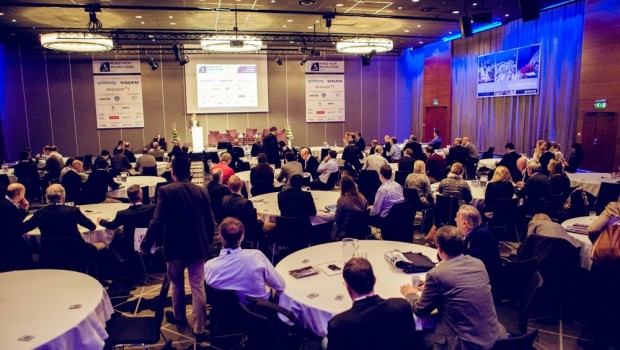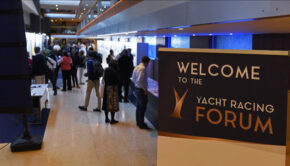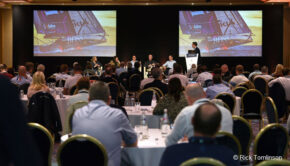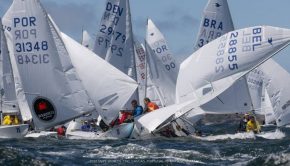Industry leaders gather for debate and discussion
Published on December 11th, 2013
By Craig Leweck, Scuttlebutt
If you are allergic to my occasional rant, I offer fair warning to take cover.
The sixth edition of World Yacht Racing Forum and Design & Technology Symposium was held this week, bringing together over 200 delegates and more than 50 speakers in Gothenburg for two days of sessions and speeches.
The conference states how it focuses on the future of the sport, but specifically it should state that it focuses on the professional layer of the sport. They use words like brand activation, pitch, revenue stream, etc.
I explain this because the conference, upon closing today, distributed a press release that was titled “Sailing as we know it is officially over”. And now countless media have picked up this headline, plastering the statement all over the internet. I found it startling.
For a conference seeking to progress the sport, I hope in the future they narrow their statements so as not to worry the bulk of the sport that is not involved in the Olympics, America’s Cup, Volvo Ocean Race, etc. I shall risk to say that for those of you enjoying the recreational side of the sport, ‘sailing as we know it is not officially over’.
If I am wrong about this, I suspect you will let me know. Rant concluded. Here is their press release (sans headline)…
The sixth edition of the World Yacht Racing Forum and Yacht Racing Design and Technology Symposium closed its doors on Wednesday night (Dec. 11, 2013) following two intense days of presentations and networking at Gothenburg’s Clarion Post Hotel.
An America’s Cup on foiling catamarans, a one-design class for the Volvo Ocean Race and key elements of the traditionally liberal IMOCA Class standardised: those are only some of the radical changes sailing has gone through in 2013, and that have been debated with passion over the last two days by the delegates of the World Yacht Racing Forum in Gothenburg, Sweden.
“Sailing as we know it is officially over,” commented keynote speaker and North Sails Group President Ken Read. Whether people like it or not, the sport is moving fast, in terms of technology but also promotion, communication tools, territories visited, classes…
”Just look at how much sailing has evolved this year and compare it with soccer,” observed Volvo Ocean Race CEO Knut Frostad. “It’s simply amazing, although I think the sport should have evolved even faster. Sailing has been much too slow at adapting some of the new technologies available.”
The World Yacht Racing Forum focused on the commercial aspects of the sport, in both offshore or in-port sailing, Olympic classes or the America’s Cup. Talking about Olympic sailing, Olympic Champion and team Artemis CEO Iain Percy insisted on the fact that “the integrity of racing must be preserved despite the increase of commercial needs. It is wrong to put too much emphasis on the final race.” An argument that seems recurrent in the World Yacht Racing Forum, already highlighted vehemently by Sir Ben Ainslie in 2012.
Some of yacht racing’s most involved sponsors attended the event, including Volvo, Stena and Macif. “The key to a successful sponsorship campaign, said the latters’ marketing director Jean-Bernard Le-Boucher, is to get involved on a long term basis, and to compete in many events. The risk-factor remains high, and a long term involvement tends to decrease it. François Gabart, Macif’s skipper and Vendée Globe winner, couldn’t agree more: his sponsor is going to support his next project of building an ‘Ultime’ trimaran, on which he will sail both the Route du Rhum single handedly before attempting a fully crewed round the world record.
Some live surveys conducted amongst the WYRF audience led to interesting conclusions: 80% of the assistance believes that online media is be the best way to reach sailing’s audience, when TV seemed to be the only way to go until recently. According to them, most sponsors (31%) are mainly interested in hospitality programs, compared to visibility on TV (26%) and social media (18%), whilst print is down to 3%…
“The most important element remains to tell a proper, interesting story, no matter on which support,” explained Peter Bayer, CEO of Open Sports Management, the entity in charge of IMOCA’s commercial development. “In order to reach a bigger audience, the sport needs to be entertaining. It’s not about the boats: we need to tell a strong story, and to speak about the people.” Luc Talbourdet, IMOCA’s CEO, fully agrees: “The key to the success of the Vendée Globe is the story, not the boat nor even the race.”
With help from Seahorse USA Editor Dobbs Davis the new one-day format of the Yacht Racing Design & Technology Symposium helped summarize the status of important projects in the world of Grand Prix sailing. Presentations made on the new Volvo 65 one-design revealed how tight tolerances and production deadlines are being met by the consortium of builders involved in the project, and the first boat sailing is generating excellent feedback from the SCA team. Maintenance and repair details were discussed, with the event expected to deliver high-intensity performance and competition at substantial cost savings from previous VOR formats.
The structural integrity of keels was also explored, with the need for more communication identified as a key factor in troubleshooting problems and developing sensible inspection and certification strategies to prevent future failures. The lessons learned from North Sails’ role in America’s Cup foil design was also presented to help illustrate how this will improve mainstream sail design.
Another interesting presentation was from Gurit on the potential uses (and mis-uses) of nanotubes in laminate structures, and how on the offshore racing yacht valuable weight can be saved at reasonable cost whilst maintaining structural integrity. The formal presentations then concluded with an overview of how rating systems are doing an increasingly better job of producing a fair playing field for a wide variety of boat types, and where these systems can improve for the future. The role of the Sailing Yacht Research Foundation (SYRF) was also described as a potential funding source for new areas of research to help improve these rating systems.
Delegates and presenters at the YRDTS then joined the Forum to participate in round-table discussions, providing a necessary technical perspective on a wide range of topics. This new format has helped open the channels of communication between the technical and non-technical communities to integrate the ideas of both.
Keynote speaker Ken Read, President, North Sails Group, concluded his presentation with a strong statement: “The economic crisis is definitely over, and I haven’t seen as much enthusiasm for the sport of sailing for a long time!”
The sixth edition of the World Yacht Racing Forum closed its doors following two days of presentations, constructive debates and networking sessions. Over 230 delegates and 60 speakers from all over the world attended the different presentations, shared ideas and business cards whilst hearing insights from some of the sport’s major events.
Details of the conference programme and speakers are available on the event’s website: www.worldyachtracingforum.com
Media & Communication: MaxComm Communication, Bernard Schopfer









 We’ll keep your information safe.
We’ll keep your information safe.